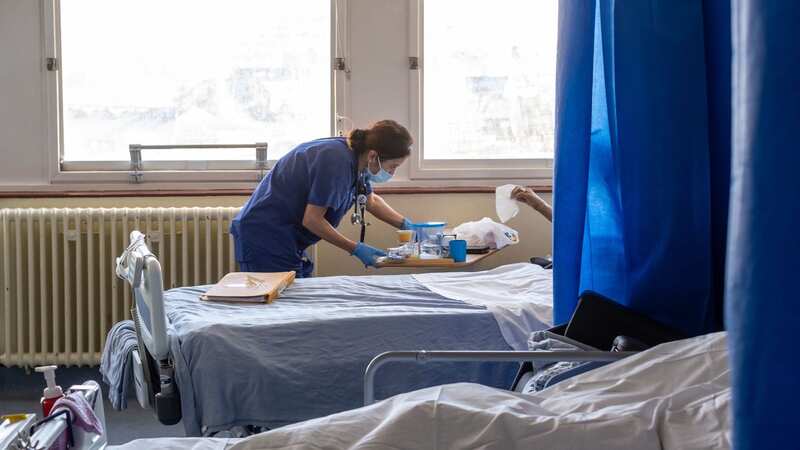

A top doctor has warned scrapping cancer targets won’t help patients as we are “in the biggest cancer crisis we have”. Oncologist Professor Pat Price said “failure is failure however you measure it” as it emerged the NHS is set to ditch a target for suspected cancer patients to see a specialist within two weeks of a GP referral.
The health service is expected to announce a “faster diagnosis standard” that will instead focus on patients getting a cancer diagnosis within 28 days. If diagnosed with cancer, patients should start treatment within 62 days from the date of referral, or within 31 days of diagnosis.
It would see the number of existing targets reduced from nine to three, with a focus on diagnosis instead of the first appointment with a consultant. Cancer Research UK said cutting targets would set “clearer expectations for patients” however it reiterated it will not address the main challenges facing cancer treatment and care. It comes after data revealed cancer wait times in England remain well below targets set by the Government and NHS.
Keir Starmer accused the Government of "moving the goalposts" on cancer targets. "I want swifter diagnosis, of course I do - both for the individuals concerned and obviously for the health service,” the Labour leader said. "The way to do that is to have a health service that's fit for the future. We haven't got one. I've set out a plan for that which involves people, technology and reform. And under the last Labour government, we had targets, we hit those targets. We didn't walk away when the going got tough.”
Do you agree with scrapping the two-week target for suspected cancer patients? Vote in our poll HERE to have your say.
 Teachers, civil servants and train drivers walk out in biggest strike in decade
Teachers, civil servants and train drivers walk out in biggest strike in decade
Prof Pat Price, who is co-founder of the CatchUpWithCancer campaign and chair of Radiotherapy UK, branded news of the potential changes "ominous and deeply worrying". She said she has requested a meeting with Health Secretary Steve Barclay "many times" but "hadn't had a response".
"The performance against the current targets is shockingly bad and has been for many, many months now, deteriorating over years,” she told BBC Radio 4. "While we agree chasing too many targets can be disruptive and divert resources away from the main patient 62-day treatment target, poor performance is not as a result of how we are measuring it. The clear and simple truth is that we are not investing enough in cancer treatment capacity and getting the whole cancer pathway working."
Cancer Research UK’s director of evidence and implementation Naser Turab said: “The reported changes to waiting time targets for England will be helpful for people affected by cancer. The shift to the Faster Diagnosis Standard - moving from nine cancer waiting time targets to three, should set clearer expectations for patients about when they should receive a diagnosis or have their cancer ruled out. But changing the targets will not address the systemic challenges that face cancer treatment and care. Political leadership is required if we’re to make sure these targets are met and then built upon. To accelerate research, boost our cancer workforce, and diagnose more cancers earlier, we need long-term funding and a clear, ambitious strategy for cancer.”
Health Secretary Steve Barclay said: “This is something led by clinicians working in cancer. It is not something being imposed by the Government, it is in response to requests by those working in the cancer field and any changes, if they are announced in the coming days, will be in consultation with the leading cancer charities."
What are the new changes?
Patients given an urgent suspected cancer referral by their GP currently should see a specialist within two weeks in England. But new plans will instead see targets focusing on diagnoses instead of appointments with consultants.
Under a new “faster diagnosis standard” (FDS), three-quarters of patients should not wait more than 28 days from a GP referral to finding out whether they have cancer or getting the all-clear. If diagnosed with cancer, patients should start treatment within 62 days from the date of referral, or within 31 days of diagnosis.
A consultation, which started last year, said the current two-week wait sets no expectation of when patients should receive test results or have a confirmed diagnosis. Cancer charities and experts have pushed for the changes as they say current diagnostic techniques have improved and targets are out of date.
The FDS is set to apply to people who are referred by their GP for suspected cancer or with breast symptoms where cancer is not suspected. It will also be used following an abnormal screening result from a cancer screening test.
Figures published by NHS England last week showed cancer wait times remain well below targets set by the Government and health service. A total of 59.2% who had their first treatment in June after an urgent GP referral had waited less than two months, up slightly from 58.7% in May but well below the target of 85%.
Some 80.5% of patients saw a specialist within two weeks, down from 80.8% in May but below the target of 93%, which was last met in May 2020. Meanwhile, 73.5% of patients urgently referred for suspected cancer were diagnosed or had cancer ruled out within 28 days, up from 71.3% the previous month.
 Greggs, Costa & Pret coffees have 'huge differences in caffeine', says report
Greggs, Costa & Pret coffees have 'huge differences in caffeine', says report
* Follow Mirror Politics on , , and .